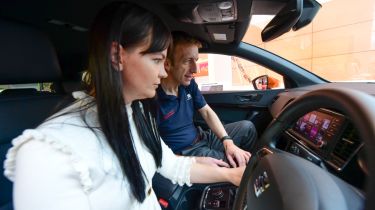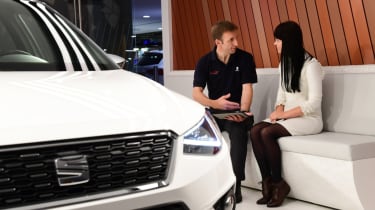
It pays to know when is the best time to buy a new or used car. If you’re buying in a hurry, such as after an accident or your current car has broken down, you might not have much choice – but if you have the luxury of time on your side, you could use this to your advantage and get a better deal when you make your next purchase by striking at the opportune moment.
We’ve put together this guide to the best times to buy a car. Here you’ll find some helpful tips and tricks for buying a new car, based on knowledge from industry experts. We’ve also covered when to buy a used car and what you should be thinking about depending on the time you choose, or are forced, to buy.
The best time to buy new
New car dealers are almost always provided with targets and incentives to sell their cars quickly and efficiently. There are all sorts of rewards for making the right amount of sales, including big bonuses for the salespeople, extra benefits and financial incentives for the businesses.
The biggest bonuses come at the end of each quarter, though sales are tracked through the whole year. In March, June, September and December – the start of each quarter – dealers won’t have as much pressure to meet these targets. Yet if you show up just before their deadlines in the preceding months, you could find them desperate to sell you a car, and offering a great deal.
The end of the financial year in April is also a good time to go looking for a deal, as businesses are keen to make as much out of each year as they can. This means that Spring is a great time to go car shopping.
The day of the week you choose to visit the dealer might not have too much impact on the price you’re likely to pay, but if you want quick and attentive service it could be best to aim for the middle of the week, as dealers are busiest at the weekend, meaning you could be left standing around or receive a rushed service.

Depending upon the brand, a factory order could take from a few weeks to well over a year in some cases, as a result of ongoing semiconductor and supply chain issues caused by the pandemic. Your dealer will be able to advise you on how long you’re likely to wait, should you opt for a factory build.
Dealers will also be very keen to get rid of cars which are just about to be replaced. Reading Auto Express’ news pages will give you a good idea of when a new or revised model is due. If you don’t mind having the older version, you can use this information to go and secure a good deal on the outgoing car.
It’s not just the cars which have bonuses attached to them. Sales staff will also be keen to hit targets for finance packages, add-on insurance, service plans and extras such as paint or interior protection. You shouldn’t feel pressured into taking any of these, but if you are interested there is likely to be room to haggle if you get the timing right.
Finally, consider a pre-registered car. If the dealer cannot find enough real buyers for new vehicles and it looks like they will miss the targets, they can register cars in their own name. They will then store them until they are three months old and sell them on to the public with a big discount.
Need to sell your car?
Find your best offer from over 5,000+ dealers. It’s that easy.
Since the peaks for new car registrations are March and September, dealers will be under the most pressure to sell in these months and are likely to resort to pre-registering. As a result, large numbers of pre-registered models will be on sale three months later, in June and December, so you could expect a good deal.
Car buying timing and the agency model
The agency model is being introduced by many car manufacturers in the UK and it could mean there’s less room for getting a good deal on new cars. The agency model sees manufacturers selling direct to the public rather than through dealer groups so dealerships become places to view and discover more about the cars but the prices are fixed centrally by the manufacturer.
While some car makers believe this could protect customers from rising costs of car production and reduce the need for haggling, the no-haggling agency model will mean customers pay one price, and buying is likely to be done in virtual showrooms or online. Timing your car buying could become less productive in the future.
The best time to buy used
Timing is less important in the used car market than the new one, but dealers still have targets, and supply and demand changes mean that prices fluctuate and you could save a few quid with the right timing.
The greatest supply of used cars will reflect the sales peaks of new models, as buyers will trade in their old cars and dealers will need to move them on. The busiest time for traders will therefore be around the new car registration changes in March and September, although the time for a car to reach a used car forecourt will lag a little as the cars will need to be processed and prepared.
The weather can also have a big impact on used car prices. Obviously, the price of a convertible rises in spring when the buyer has the prospect of a full summer of top-down motoring ahead of them, while 4x4s are more sought after in the winter when the thought of snow and floods is in buyers’ minds.
The weather can have other odd effects on the used car market. Purchasers don’t like to trudge around forecourts in the rain and cold, so a prolonged spell of bad weather can make dealers (and even private sellers) more anxious to do a deal. Ironically, the same is true of really good weather. Sunny summer weekends are usually spent at the beach or a barbeque rather than prodding around cars, and car dealer’s sites will usually be deserted.
Once you have finally done a deal, it can also make sense to pick up a used car at the beginning of a month to save yourself paying for just a few days of road tax. The DVLA makes you pay for a full month even if you just want to use the car for a couple of days, and it’s not transferrable from the previous owner.
It won’t make much of a difference on small cars which have a low (or zero) VED tax rate, but bigger-engined models are expensive to tax for a year, so picking up a car at the beginning of the next month could save enough for an extra tank of fuel.
Frequently Asked Questions
The months preceding a new financial quarter (February, May, August and November) are good months if you are looking for a deal, as dealers will want a strong end to the quarter and to meet their targets.
April is also a good time to go looking for a deal, as businesses look to maximise their performance at the end of the financial year and may be extra keen to make sales.
While the day of the week has little effect on the price you are likely to pay, you may receive a better customer service experience if you visit your dealer in the middle of the week, as weekends are usually busiest for dealers.
February and August could be the best time to buy an approved-used or second hand car as car dealers will often take a lower price as they look to move on older stock and make room on the forecourt in the run up to plate changes. Buying out of season also makes sense with some models, convertibles and track day cars could be slightly cheaper in winter.
Looking to buy a new or used car? Make sure you understand the different types of car finance offered…

